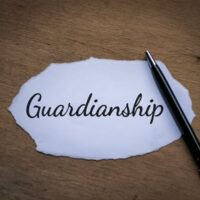How Does Guardianship Work In Florida?

Quite simply, guardians act on behalf of people who, normally due to a disability, cannot act for themselves. Age, either extreme youth (under 18) or extreme age, is the most common guardianship disability. A guardian controls a person’s person or property, and sometimes both person and property. Any Florida resident who meets certain legal standards, and these standards are very low, can be a guardian.
Overall, guardianship works through the Florida courts. Once a petition is filed, the court must appoint an Orlando guardianship lawyer to represent the alleged incompetent person (AIP) within five days. An examining committee must evaluate the AIP and submit a report to the court within fifteen days. The court must then hold a hearing no later than fourteen days thereafter. This report should include a diagnosis, prognosis and a recommended course of treatment.
Types of Guardianship
No guardian, regardless of the circumstances, can have a criminal record that includes a felony or certain other offenses, such as abuse, abandonment, or neglect of a child. Specific kinds of guardians include:
- Guardian of the Person: This individual is fully responsible for the ward’s day-to-day personal care. These guardians also make medical decisions and determine living arrangements. The guardian must file initial plans and annual reports.
- Guardian of the Property: The other most common type of guardian manages the individual’s financial matters, such as paying bills, handling investments, and managing income.
- Plenary Guardian: The most common kind of guardian in Florida has full authority over both the person and property of the individual. Usually, if people cannot manage their daily lives, they cannot effectively manage their property.
- Limited Guardian: Limited guardians are basically personal assistants with decision-making authority. These guardians have the same power as plenary guardians, but only over certain areas of the individual’s life, as determined by the court.
- Guardian Advocate: This type of guardianship is exclusively for adults with developmental disabilities. GAs provide advice and assistance in personal and property matters without declaring the person legally incapacitated.
The aforementioned petition is usually a petition to determine incapacity. It asks the court to evaluate the AIP and determine the AIP’s capacity, or lack thereof. That’s when the three-person examining committee, which usually includes two doctors and a non-doctor, steps into the arena.
An Orlando guardianship lawyer usually files a petition for appointment of guardian along with the incapacity determination petition. It asks the court to appoint a suitable guardian if the committee determines the AIP is indeed incapacitated.
Guardian Responsibilities
If the court finds the individual partially or totally incapacitated, it must determine the appropriate type of guardianship, as outlined above. All guardians have a fiduciary duty toward all wards. Guardians must set aside all other priorities and only make decisions which are in the ward’s best interests.
Under Florida law, guardians must always seek the least restrictive alternative and preserve as much of the ward’s independence as possible.
Florida courts maintain strict oversight of guardianships. Annual reports on the ward’s well-being and financial condition must be submitted. If the ward regains capacity, or if a less restrictive alternative is found, usually a power of attorney or supported decision-making agreement, the guardianship can be modified or terminated.
Reach Out to a Diligent Orange County Lawyer
Comprehensive estate plans address issues that affect the living and the dead. For a confidential consultation with an experienced guardianship lawyer in Orlando, contact Gierach and Gierach, P.A. After-hours visits are available.
Source:
floridabar.org/public/consumer/pamphlet030/#:~:text=interest%20may%20occur.-,What%20Does%20a%20Guardian%20Do?,ward%20is%20incapable%20of%20exercising.
